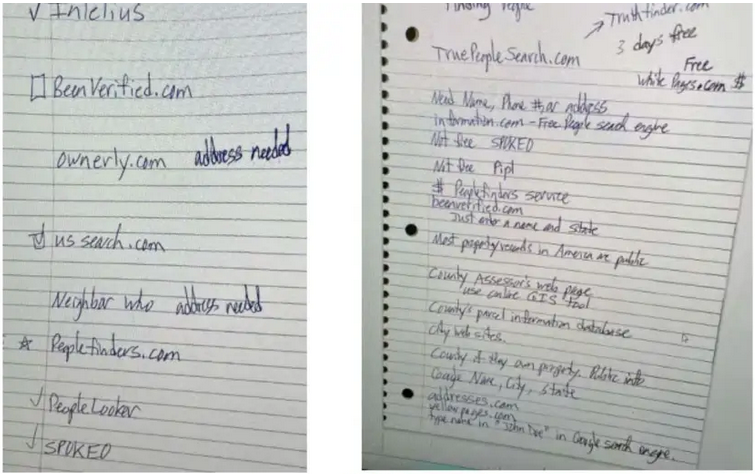
How Public Personal Info Helped the Minnesota Shooter Target His Victims
Categories: Cybersecurity, Data, Data Brokers, Data Privacy, Digital Footprint, Government, PII, Social Media, Surveillance
On June 14, 2025, Minnesota witnessed a harrowing act of political violence when Vance Luther Boelter, a 57-year-old former gubernatorial appointee, fatally shot State Representative Melissa Hortman and her husband, Mark, and wounded State Senator John Hoffman and his wife, Yvette.
Boelter, disguised as a police officer, carried out these attacks at the victims’ homes in Brooklyn Park and Champlin, respectively. He leveraged public personal information about his victims, and likely many other data sources to target and execute his attack. While public figures are high-risk, Boelter’s methods also speak to a far broader security threat impacting every US citizen.
Boelter’s “Manifesto” Was A Warning To All US Citizens
While there was clearly a political motivation, his documents are not considered a manifesto – they do not focus on his ideology or specific motivations.
According to the acting U.S. Attorney for Minnesota, Joe Thompson, Boelter had multiple notebooks containing names of targets, plans, surveillance efforts, relationships and more (Time Magazine). Boelter had also targeted his victims based on their political affiliations and even preferences on specific legislation.
However, his writings do show us exactly how Boelter found and surveyed his victims – and in particular how easy it was for him to access personal information about his victims from online platforms.
How Did Boelter Find His Victims?

This notebook page of Boelter’s has been widely reported on in the media. It’s not just a scribble – Boelter is listing our online directories and people search sites that he used to gather data on his victims. Relatively well-known data brokers like Intelius, BeenVerified.com, and Spokeo contain millions of records. If you’re a US citizen, there is a good chance you’re already listed on these sites.
While data brokers expose critical, sensitive information to the public – for many people, social media serves a similar purpose. Social media accounts, often public, give people an even richer window into your life – often revealing information about your family, relationships, work, day to day movements and more. Boelter’s stalking was extensive and persistent – while unconfirmed, it is almost certain he stalked the public social media accounts of his victim’s and their families.
People Search Sites Put Lives At Risk
Lawmakers across the US are moving to delete their home addresses from online directories. Boelter allegedly had detailed notes on the homes and lives of dozens of state and federal officials. This seems to have prompted a much-needed overhaul of lawmaker privacy. Until Boelter, North Dakota Legislature’s staff agency were actually listing lawmakers’ address on their biographical webpages.
The scariest part – exposed personal information doesn’t just affect politicians. People search sites contain millions of records. If you’re a US citizen and haven’t taken steps to remove your data, you almost definitely have personal information available publicly on the internet to anyone that cares enough to look for it.
To sum up – an unsophisticated food service worker with delusions of grandeur managed to surveil, target, locate, and assassinate political targets using publicly available online tools and resources.
Pretty much anyone – especially hackers, scammers, surveillance companies – can probably assemble a detailed report on who you are, your relationships, movements, and personal information – just by using public tools.
Reduce Risk of Targeted Stalkers, Scammers, and Hackers
The Minnesota tragedy serves as a stark reminder of the potential consequences of unchecked online personal information.
Social media is perhaps the richest source of detailed personal information. It’s also regularly leveraged by stalkers, scammers and hackers. Your socials likely contain information about your relationships, travel and movement, employment, opinions and more. This information can be used to scam you, and your family & friends.
Between political violence, and the ever-present threats of surveillance, scammers, and hackers – now is the time to tighten up your digital footprint. Here’s what we recommend:
1. Set as many accounts as possible to private
If you can, change as many accounts as possible to private or on-request. Reduce content visibility to the strictest possible settings (ideally so only people you actually know can see your posts).
If you need to leave accounts public, step 2 below becomes even more critical.
2. Remove non-essential personal information
You should urgently delete all personally identifiable information on your social media accounts. Even if your account is private, you may be a target for a breach. In the event that your account gets accessed maliciously, the hacker will find a treasure trove of personal information for them to use or sell. Not good.
Our app, redact.dev can help you wipe old content in bulk from all major platforms – saving you the days or weeks it would take to delete content from years ago across multiple platforms.
3. Enable 2-factor authentication
2-factor authentication is becoming the default for a lot of platforms – yours should be no exception. It’s considerably more secure than only having a password and reduces the risk of your account getting compromised massively. You should enable 2FA on all your accounts right now (social media or otherwise).
Digital hygiene has become critical to your safety – every day there are new threats, surveillance technology, scammers, hackers and more. Every day you let your digital footprint grow unchecked, the risk of you being targeted increases.
This is why we built redact.dev – to give people control of their data on socials again. Redact is the only tool that lets you delete years of content across major social media platforms in bulk, automatically. You can try it for free on Twitter, Reddit, Facebook, and Discord. Just download Redact.dev and set up an account for free.